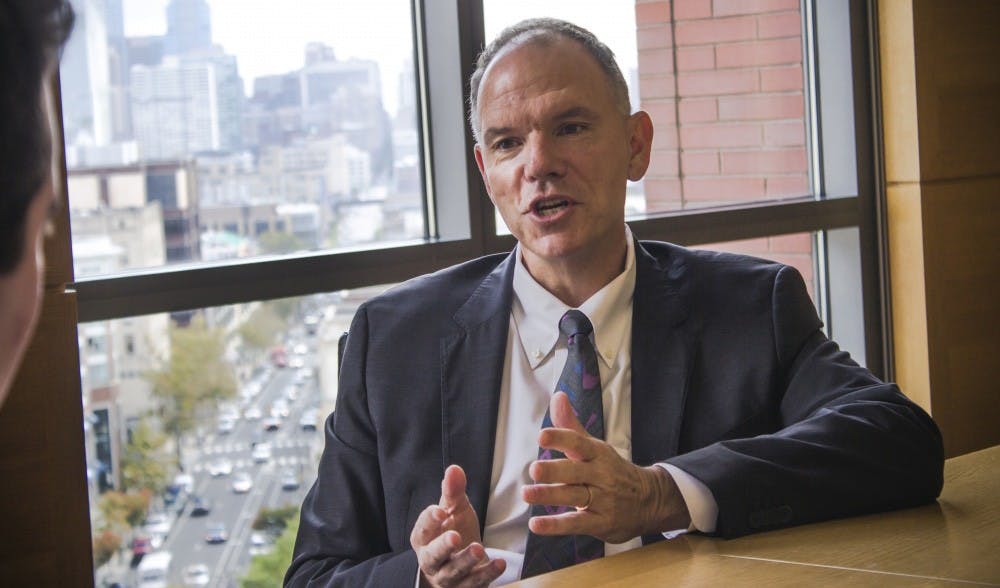
Wharton Dean Geoffrey Garrett
Credit: Amanda SuarezWharton Dean Geoffrey Garrett is a busy man. Since January, he has traveled around the world and back on his Global Conversations Tour, with a visit to the opening of the Penn Wharton China Center and brief returns to Philadelphia in between.
Yesterday, Garrett took time out of his busy schedule to lecture to all three sections of the Wharton core class Management 101 about the Wharton School’s business strategy.
Garrett’s visit came about when he expressed in a meeting — for which MGMT 101 professor Martine Haas was present — that as Dean, he no longer had the opportunity to be in the classroom.
Garrett was a management professor at Wharton from 1995 to 1997 before he returned to the school as Dean in 2014.
“I love teaching and miss the opportunity to engage with students in such a classic setting,” Garrett said in a statement. “Your ideas ... Your energy! Your voices help me understand on the ground what Wharton is delivering and helps shape our strategies from curriculum development to marketing.”
Garrett covered three topics during his lecture: globalization, scope and strategy.
Garrett emphasized that globalization and technology have resounding effects, reaching the world of business schools.
“As you all know, the world has come to the U.S. and to the Wharton school for a very long time,” Garrett told students. “We need to come to the world as well.”
Garrett mentioned Wharton’s recently released Business Specialization online courses on Coursera, which were designed to “give the world a taste of the Wharton Education,” as well as the new Penn Wharton China Center — “We’ve got to be [in China] to make change,” he said.
The second topic of conversation was Wharton’s scope of offerings. “The Wharton School does everything we think we can do,” he said. “But ‘Wharton does everything’ is not a conscious strategic choice. The question today is should we keep doing that.”
Garrett said that although some businesses focus on core competencies, Wharton’s “incredible” breadth of activity is “probably not a bad thing ... since we don’t know how things are going to play out.”
Before concluding his lecture, Garrett revealed how he formulates Wharton’s strategy.
“Consultation with stakeholders is important on formulation and implementation,” he said. “I spend all my time talking to people — the more people I talk to from the broadest range of perspectives and backgrounds, the more ideas I have to contemplate. If people feel they’ve been involved in formulating the decision, they’ll be better at the execution.”
In each of the classes, Garrett’s 30-minute lecture was followed by a 15-minute question-and-answer period.
One student asked Garrett to comment on Wharton’s reputation as a finance school.
“When people say, ‘Wharton, that’s the finance school,’ my one line response is that Wharton is more than a finance school,” he said. “I am pushing analytics and innovation and entrepreneurship ... People think its either-or — finance or entrepreneurship — but a lot of people are both. We all love the heritage [of Wharton], but we don’t want to rest on our laurels.”
Students were generally impressed that Garrett took the time out of his schedule to speak to them.
“I really enjoyed it,” Wharton junior Jonathan Copeland said. “I wanted to kind of meet him and see him once it was announced that he was coming to the school last year.”
Wharton sophomore Ashley Montgomery also appreciated the dean’s lecture.
“I thought it was really cool that he made the effort to come into an undergraduate class because I feel we really don’t see much of him,” Montgomery said. “I think it was important to know that he was willing to go out of his way to connect with us.”
When asked about Garrett’s overall visibility to students, both Copeland and Montgomery agreed that the Dean is visible enough, given his role.
“I think it’s kind of assumed in his job that he needs to travel a lot,” Copeland said. “If you think about the school as a business, they need their investors or their alumni. He needs to meet them so they will donate money. It’s because of those alums that Wharton is the best business school.”
Montgomery added that even though she had not recognized Garrett in the photo that Haas had shown students when she informed them a few weeks ago of his upcoming visit, she felt that his love of interacting with students was evident.
“I feel like the fact that I can say he came in to talk seems like someone who is trying to make an effort,” she said. “He is putting his words into action.”
The Daily Pennsylvanian is an independent, student-run newspaper. Please consider making a donation to support the coverage that shapes the University. Your generosity ensures a future of strong journalism at Penn.
DonatePlease note All comments are eligible for publication in The Daily Pennsylvanian.





